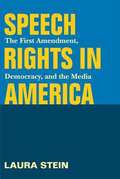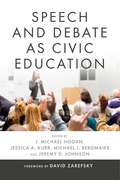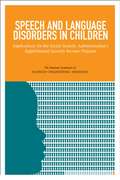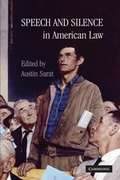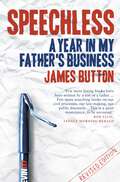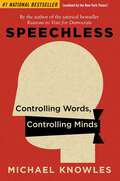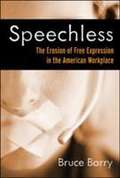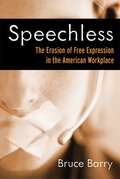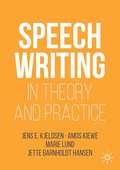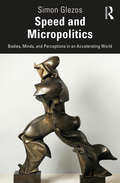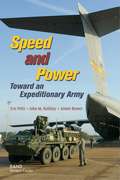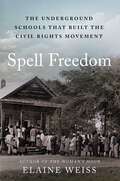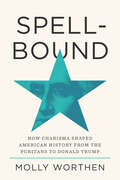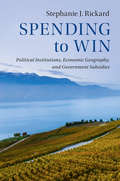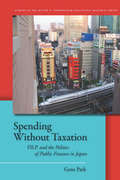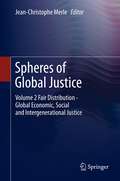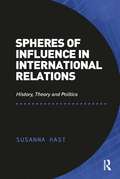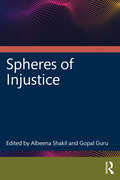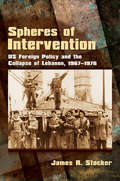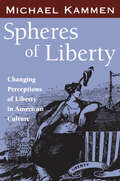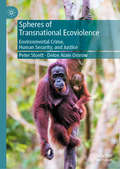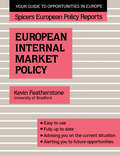- Table View
- List View
Speech Rights in America: The First Amendment, Democracy, and the Media
by Laura SteinThe First Amendment is the principle guarantor of speech rights in the United States, but the Supreme Court's interpretations of it often privilege the interests of media owners over those of the broader citizenry. In Speech Rights in America, Laura Stein argues that such rulings alienate citizens from their rights, corrupt the essential workings of democracy, and prevent the First Amendment from performing its critical role as a protector of free speech. Drawing on the best of the liberal democratic tradition, Stein demonstrates that there is a significant gap between First Amendment law and the speech rights necessary to democratic communication, and proposes an alternative set of principles to guide future judicial, legislative, and cultural policy on old and new media.
Speech and Debate as Civic Education (Rhetoric and Democratic Deliberation #15)
by J. Michael Hogan Jessica A. Kurr Michael J. Bergmaier Jeremy D. JohnsonIn an era increasingly marked by polarized and unproductive political debates, this volume makes the case for a renewed emphasis on teaching speech and debate, both in and outside of the classroom.Speech and debate education leads students to better understand their First Amendment rights and the power of speaking. It teaches them to work together collaboratively to solve problems, and it encourages critical thinking, reasoned and fact-based argumentation, and respect for differing viewpoints in our increasingly diverse and global society. Highlighting the need for more emphasis on the ethics and skills of democratic deliberation, the contributors to this volume—leading scholars, teachers, and coaches in speech and debate programs around the country—offer new ideas for reinvigorating curricular and co-curricular speech and debate by recovering and reinventing their historical mission as civic education.Combining historical case studies, theoretical reflections, and reports on programs that utilize rhetorical pedagogies to educate for citizenship, Speech and Debate as Civic Education is a first-of-its-kind collection of the best ideas for reinventing and revitalizing the civic mission of speech and debate for a new generation of students.In addition to the editors, the contributors to this volume include Jenn Anderson, Michael D. Bartanen, Ann Crigler, Sara A. Mehltretter Drury, David A. Frank, G. Thomas Goodnight, Ronald Walter Greene, Taylor W. Hahn, Darrin Hicks, Edward A. Hinck, Jin Huang, Una Kimokeo-Goes, Rebecca A. Kuehl, Lorand Laskai, Tim Lewis, Robert S. Littlefield, Allan D. Louden, Paul E. Mabrey III, Jamie McKown, Gordon R. Mitchell, Catherine H. Palczewski, Angela G. Ray, Robert C. Rowland, Minhee Son, Sarah Stone Watt, Melissa Maxcy Wade, David Weeks, Carly S. Woods, and David Zarefsky.
Speech and Debate as Civic Education (Rhetoric and Democratic Deliberation)
by David Zarefsky Jessica A. Kurr Michael J. Bergmaier Jeremy D. Johnson Michael HoganIn an era increasingly marked by polarized and unproductive political debates, this volume makes the case for a renewed emphasis on teaching speech and debate, both in and outside of the classroom.Speech and debate education leads students to better understand their First Amendment rights and the power of speaking. It teaches them to work together collaboratively to solve problems, and it encourages critical thinking, reasoned and fact-based argumentation, and respect for differing viewpoints in our increasingly diverse and global society. Highlighting the need for more emphasis on the ethics and skills of democratic deliberation, the contributors to this volume—leading scholars, teachers, and coaches in speech and debate programs around the country—offer new ideas for reinvigorating curricular and co-curricular speech and debate by recovering and reinventing their historical mission as civic education.Combining historical case studies, theoretical reflections, and reports on programs that utilize rhetorical pedagogies to educate for citizenship, Speech and Debate as Civic Education is a first-of-its-kind collection of the best ideas for reinventing and revitalizing the civic mission of speech and debate for a new generation of students.In addition to the editors, the contributors to this volume include Jenn Anderson, Michael D. Bartanen, Ann Crigler, Sara A. Mehltretter Drury, David A. Frank, G. Thomas Goodnight, Ronald Walter Greene, Taylor W. Hahn, Darrin Hicks, Edward A. Hinck, Jin Huang, Una Kimokeo-Goes, Rebecca A. Kuehl, Lorand Laskai, Tim Lewis, Robert S. Littlefield, Allan D. Louden, Paul E. Mabrey III, Jamie McKown, Gordon R. Mitchell, Catherine H. Palczewski, Angela G. Ray, Robert C. Rowland, Minhee Son, Sarah Stone Watt, Melissa Maxcy Wade, David Weeks, Carly S. Woods, and David Zarefsky.
Speech and Language Disorders in Children: Implications for the Social Security Administration’s Supplemental Security Income Program
by Engineering Medicine National Academies of SciencesSpeech and language are central to the human experience; they are the vital means by which people convey and receive knowledge, thoughts, feelings, and other internal experiences. Acquisition of communication skills begins early in childhood and is foundational to the ability to gain access to culturally transmitted knowledge, organize and share thoughts and feelings, and participate in social interactions and relationships. Thus, speech disorders and language disorders--disruptions in communication development--can have wide-ranging and adverse impacts on the ability to communicate and also to acquire new knowledge and fully participate in society. Severe disruptions in speech or language acquisition have both direct and indirect consequences for child and adolescent development, not only in communication, but also in associated abilities such as reading and academic achievement that depend on speech and language skills. The Supplemental Security Income (SSI) program for children provides financial assistance to children from low-income, resource-limited families who are determined to have conditions that meet the disability standard required under law. Between 2000 and 2010, there was an unprecedented rise in the number of applications and the number of children found to meet the disability criteria. The factors that contribute to these changes are a primary focus of this report. Speech and Language Disorders in Children provides an overview of the current status of the diagnosis and treatment of speech and language disorders and levels of impairment in the U.S. population under age 18. This study identifies past and current trends in the prevalence and persistence of speech disorders and language disorders for the general U.S. population under age 18 and compares those trends to trends in the SSI childhood disability population.
Speech and Silence in American Law
by Austin SaratRather than abstract philosophical discussion or yet another analysis of legal doctrine, Speech and Silence in American Law seeks to situate speech and silence, locating them in particular circumstances and contexts and asking how context matters in facilitating speech or demanding silence. To understand speech and silence we have to inquire into their social life and examine the occasions and practices that call them forth and that give them meaning. Among the questions addressed in this book are, Who is authorized to speak? And what are the conditions that should be attached to the speaking subject? Are there occasions that call for speech and others that demand silence? What is the relationship between the speech act and the speaker? Taking these questions into account helps readers understand what compels speakers and what problems accompany speech without a known speaker, allowing us to assess how silence speaks and how speech renders the silent more knowable.
Speechless: A Year In My Father's Business: Updated Edition
by James ButtonJames Button spent a year writing speeches for Kevin Rudd. Before that, he reported on politics as a highly regarded journalist for Fairfax. But James also has politics in the blood: his father was the diminutive but larger-than-life Senator John Button, who was a minister in the Hawke and Keating governments. Growing up, James watched a roll-call of political luminaries debating the fate of the Labor Party. He saw great victories and defeats at close hand. He believes both his father and his family paid a heavy price for politics. Speechless is James' highly personal account of a year working in Canberra, seen from both the inside and the outside. It's told through his experience of Kevin Rudd's failure to tell his story, and how this helped destroy his prime ministership. It also reflects on how far the Labor Party has moved from the idealism and pragmatism of his father's generation. He ends on a note of hope for the Party's revival.
Speechless: Controlling Words, Controlling Minds
by Michael Knowles&“Every single American needs to read Michael Knowles&’s Speechless. I don&’t mean &‘read it eventually.&’ I mean: stop what you&’re doing and pick up this book.&” —CANDACE OWENS "The most important book on free speech in decades—read it!&” —SENATOR TED CRUZ A New Strategy: We Win, They Lose The Culture War is over, and the culture lost. The Left&’s assault on liberty, virtue, decency, the Republic of the Founders, and Western civilization has succeeded. You can no longer keep your social media account—or your job—and acknowledge truths such as: Washington, Jefferson, and Columbus were great men. Schools and libraries should not coach children in sexual deviance. Men don&’t have uteruses. How did we get to this point? Michael Knowles of The Daily Wire exposes and diagnosis the losing strategy we have fallen for and shows how we can change course—and start winning. In the groundbreaking Speechless: Controlling Words, Controlling Minds Knowles reveals: How the &“free speech absolutists&” gave away the store The First Amendment does not require a value-neutral public square How the Communists figured out that their revolution could never succeed as long as the common man was attached to his own culture Where political correctness came from How, comply or resist, political correctness is a win-win game for the bad guys Why taking our stand on &“freedom of speech&” helps put atheism, decadence, and nonsense on the same plane with faith, virtue, and reality The real question: Will we shut down drag queen story hour, or cancel Abraham Lincoln? For 170 years the First Amendment was compatible with prayer in public school How the atheists got the Warren Court to rule their way To this day, there&’s a First Amendment exception for obscenity. What exactly is the argument that perverts&’ teaching toddlers to twerk is not obscene? Read Speechless: Controlling Words, Controlling Minds if you want to learn how to take the fight to the enemy.
Speechless: The Erosion of Free Expression in the American Workplace
by Bruce BarryA factory worker is fired because her boss dislikes the political bumper sticker on her car in the parking lot. Another is canned after refusing to display an American flag at his workstation.
Speechless: The Erosion of Free Expression in the American Workplace
by Bruce BarryA factory worker is fired because her boss disagrees with her political bumper sticker. A stockbroker feels pressure to resign from an employer who disapproves of his off-hours political advocacy. A flight attendant is grounded because her airline doesn't like what she's writing in her personal blog. Is it legal to fire people for speech that makes employers uncomfortable, even if the content has little or nothing to do with their job or workplace? For most American workers, the alarming answer is yes. Speechless takes on the state of free expression in the American workplace, exploring its history, explaining how and why Americans have come to take freedom of speech for granted, and demonstrating how employers can legally punish employees for speaking their minds. Bruce Barry shows how constitutional law erects formidable barriers to free speech in workplaces, while employment law gives employers wide latitude to suppress speech with impunity--even speech that is unrelated to the job or the company. Employers, with rights of property ownership over not just what they manage but how they manage, can decide just how much employee speech they will tolerate. Workers have little choice but to accept conditions of employment or go elsewhere. Barry argues that a toxic combination of law, conventional economic wisdom, and accepted managerial practice has created an American workplace in which freedom of speech--that most crucial of civil liberties in a healthy democracy--is something you do after work, on your own time, and even then (for many), only if your employer approves. Barry proposes changes both to the law and to management practice that would expand employees' expressive rights without jeopardizing the legitimate interests of employers. In defense of freer speech in and around the workplace, Barry argues that a healthy democracy depends in part on the experience of liberty at work. Workplaces are key venues for shared experience and public discourse, so workplace speech rights matter deeply for advancing citizenship, community, and democracy in a free society.
Speechwriting in Theory and Practice (Rhetoric, Politics and Society)
by Jens E. Kjeldsen Amos Kiewe Marie Lund Jette Barnholdt Hansen (Deceased)This book provides students, researchers, and practitioners of speechwriting with a unique insight in the theory, history, and practice of speechwriting. The combination of theory and practice with case studies from the United States and Europe makes this volume the first of its kind. The book offers an overview of the existing research and theory, analysing how speeches are written in political and public life, and paying attention to three central subjects of contemporary speechwriting: convincing characterization of the speaker, writing for the ear, and appealing with words to the eye. Chapters address the ethics and the functions of speechwriting in contemporary society and also deliver general instructions for the speechwriting process. This book is recommended reading for professional speechwriters wishing to expand their knowledge of the rhetorical and theoretical underpinnings of speechwriting, and enables students and aspiring speechwriters to gain an understanding of speechwriting as a profession.
Speechwriting in Theory and Practice (Rhetoric, Politics and Society)
by Jens E. Kjeldsen Amos Kiewe Marie Lund Jette Barnholdt HansenThis book provides students, researchers, and practitioners of speechwriting with a unique insight in the theory, history, and practice of speechwriting. The combination of theory and practice with case studies from the United States and Europe makes this volume the first of its kind. The book offers an overview of the existing research and theory, analysing how speeches are written in political and public life, and paying attention to three central subjects of contemporary speechwriting: convincing characterization of the speaker, writing for the ear, and appealing with words to the eye. Chapters address the ethics and the functions of speechwriting in contemporary society and also deliver general instructions for the speechwriting process. This book is recommended reading for professional speechwriters wishing to expand their knowledge of the rhetorical and theoretical underpinnings of speechwriting, and enables students and aspiring speechwriters to gain an understanding of speechwriting as a profession.
Speed and Micropolitics: Bodies, Minds, and Perceptions in an Accelerating World
by Simon GlezosThis book provides a theoretical framework for understanding the micropolitics of speed; a rich, nuanced, and embodied account of life in an accelerating world. What does it feel like to live in an era of profound social acceleration? What kinds of affects, perceptions, and identities does an accelerating world produce? The answers to these questions mean more than simply understanding the psychology of speed; they also mean understanding issues in contemporary politics as diverse as xenophobia and anti-immigration policies, patterns of transnational identification and solidarity, social isolation and alienation, and the ability of new media to coordinate social movements. While drawing extensively on the work of contemporary theorists, Simon Glezos recognizes that social acceleration is not a purely recent phenomenon. He therefore turns to thinkers such as Nietzsche, Spinoza, Bergson, and Merleau-Ponty, to ask how they sought to understand, and respond to, the rapid changes and unsettling temporalities of their eras, and how their insights can be applied to our own. Advancing theoretical understanding and offering a useful way to analytically conceptualize the nature of time, Speed and Micropolitics will be of interest to students and scholars studying affect theory, theories of the body, new materialism, phenomenology, as well as the history of political thought.
Speed and Power
by John Halliday Eric Peltz Aimee BowerUsing a case study based on the Army's new Stryker Brigade Combat Team, the authors explore how the Army might improve its ability to contribute to prompt, global power projection, that is, strategically responsive early-entry forces for time-critical events. The authors examine options to reach a dual goal: to initiate deployment of the right force capabilities, and then get those capabilities where they need to be as quickly as possible.
Spell Freedom: The Underground Schools That Built the Civil Rights Movement
by Elaine WeissThe acclaimed author of the &“stirring, definitive, and engrossing&” (NPR) The Woman&’s Hour returns with the story of four activists whose audacious plan to restore voting rights to Black Americans laid the groundwork for the Civil Rights Movement. In the summer of 1954, educator Septima Clark and small businessman Esau Jenkins travelled to rural Tennessee&’s Highlander Folk School, an interracial training center for social change founded by Myles Horton, a white southerner with roots in the labor movement. There, the trio united behind a shared mission: preparing Black southerners to pass the daunting Jim Crow era voter registration literacy tests that were designed to disenfranchise them. Together with beautician-turned-teacher Bernice Robinson, they launched the underground Citizenship Schools project, which began with a single makeshift classroom hidden in the back of a rural grocery store. By the time the Voting Rights Act was signed into law in 1965, the secretive undertaking had established more than nine hundred citizenship schools across the South, preparing tens of thousands of Black citizens to read and write, demand their rights—and vote. Simultaneously, it nurtured a generation of activists—many of them women—trained in community organizing, political citizenship, and tactics of resistance and struggle who became the grassroots foundation of the Civil Rights Movement. Dr. King called Septima Clark, &“Mother of the Movement.&” In the vein of Hidden Figures and Devil in the Grove, Spell Freedom is both a riveting, crucially important lens onto our past, and a deeply moving story for our present.
Spellbound: How Charisma Shaped American History from the Puritans to Donald Trump
by Molly WorthenWhat happens when Americans lose faith in their religious institutions—and politicians fill the void? From the Puritans to Donald Trump, this sweeping history will change your understanding of the forces that create leaders and hold their followers captive.&“Elegant and insightful, Spellbound is an important contribution to the urgent project of understanding America in our time.&”—Jon MeachamEveryone feels it. Cultural and political life in America has become unrecognizable and strange. Firebrands and would-be sages have taken the place of reasonable and responsible leaders. Nuanced debates have given way to the smug confidence of yard signs. How did we get here?In Spellbound, historian Molly Worthen argues that we will understand our present moment if we learn the story of charisma in America. From the Puritans and Andrew Jackson to Black nationalists and Donald Trump, the saga of American charisma, Worthen argues, stars figures who possess a dangerous and alluring power to move crowds. They invite followers into a cosmic drama where hopes are fulfilled and grievances are put right—and these charismatic leaders insist that they alone plot the way.The story of charisma in America reveals that when traditional religious institutions fail to deliver on their promise of a meaningful life, people will get their spiritual needs met in a warped cultural and political landscape dominated by those who appear to have the power to bring order and meaning out of chaos. Charismatic leaders address spiritual needs, offering an alternate reality where people have knowledge, power, and heroic status, whether as divinely chosen instruments of God or those who will restore national glory.Through Worthen&’s centuries-spanning historical research, Spellbound places a crucial religious lens on the cultural, economic, and political upheavals facing Americans today.
Spending to Win: Electoral Institutions, Economic Geography, And Subsidies (Political Economy Of Institutions And Decisions)
by Stephanie J. RickardGovernments in some democracies target economic policies, like industrial subsidies, to small groups at the expense of many. Why do some governments redistribute more narrowly than others? Their willingness to selectively target economic benefits, like subsidies to businesses, depends on the way politicians are elected and the geographic distribution of economic activities.<P><P>Based on interviews with government ministers and bureaucrats, as well as parliamentary records, industry publications, local media coverage, and new quantitative data, Spending to Win: Political Institutions, Economic Geography, and Government Subsidies demonstrates that government policy-making can be explained by the combination of electoral institutions and economic geography. Specifically, it shows how institutions interact with economic geography to influence countries' economic policies and international economic relations. Identical institutions have wide-ranging effects depending on the context in which they operate. No single institution is a panacea for issues, such as income inequality, international economic conflict, or minority representation.<P> Presents evidence from interviews with government ministers and bureaucrats.<P> Provides one of the first book-length studies of government subsidies<P> Explores how political institutions and economic geography interact to shape public policy.
Spending without Taxation: FILP and the Politics of Public Finance in Japan
by Gene ParkPark (political science, Baruch College) conducts an analysis of Japan's use of the Fiscal Investment Loan Program (FILP) in the postwar years. He argues that this financial mechanism enabled the ruling Liberal Democratic Party to maintain low taxes and a neoclassical fiscal policy based on low budget spending accompanied by pork barrel spending. This commitment to budget constraint enabled by FILP delivered economic benefits and was central to the postwar political bargain of budget restraint without sacrificing spending, he argues, but came at the cost of heavy intervention in finance, deferred fiscal burden, and the political challenge of reforming the program once the quality of its investments and loans deteriorated by the 1980s because the LDP had exploited the program too much in order to balance competing interests between fiscal hawks and pork-barrel politicians in order to maintain political power. Annotation ©2011 Book News, Inc. , Portland, OR (booknews. com)
Spheres of Global Justice: Volume 1 Global Challenges to Liberal Democracy. Political Participation, Minorities and Migrations; Volume 2 Fair Distribution - Global Economic, Social and Intergenerational Justice
by Jean-Christophe MerleSpheres of Global Justice analyzes six of the most important and controversial spheres of global justice, each concerning a specific global social good. These spheres are democratic participation, migrations, cultural minorities, economic justice, social justice, and intergenerational justice. Together they constitute two constellations dealt with, in this collection of essays by leading scholars, in two different volumes: Global Challenges to Liberal Democracy and Fair Distribution. These essays illustrate each of the spheres, delving into their differences, commonalities, collisions and interconnections. Unlike many writings on global justice, Spheres of Global Justice does not content itself with describing the painful and advantageous effects of the globalization process as being ipso facto a global injustice or a just global order. Rather, this multidisciplinary collection of essays, from a pluralist inspiration, combines empirical analysis with theoretical approaches and ethical principles, paying close attention to two aspects of the effects of the globalization process. These aspects are the causal relationships that lead to such effects and the kinds of obligations, or of normative relationships between global rights and correlative duties, that applies to each specific individual case. This volume illustrates how diverse global obligations are, and how they can be, grounded in diverse relationships (identity, ability to provide help, causal responsibility, past injustices, protection of agency and promotion of independence, etc.). These essays also demonstrate that an ethical global approach has not only international or transnational, but also domestic, local and interpersonal dimensions.
Spheres of Influence in International Relations: History, Theory and Politics
by Susanna HastCurrent events happening around the world, especially the ’humanitarian interventions’ by NATO and the West within the context of the so-called Arab Spring, make the understanding of the role of spheres of influence in international politics absolutely critical. Hast explores the practical implications and applications of this theory, challenging the concept by using historical examples such as suzerainty and colonialism, as well as the emergence of a hierarchical international order. This study further connects the English School tradition, post-war international order, the Cold War and images of Russia with the concept of the sphere of influence to initiate debate and provide a fresh outlook on a concept which has little recent attention.
Spheres of Injustice
by Albeena Shakil and Gopal GuruThis book presents a comprehensive overview of modern conceptualizations of justice in India. It analyses how these concepts relate to traditional theories of justice – in Marx, Ambedkar, Gandhi and Rawls as well as social realities in India. The book critically analyses theories of justice in India from a theoretical and comparative framework. It brings together contributions by well-known scholars to explore a range of questions and dilemmas around justice which have been brought about by a widening disparity between the powerful and the marginalized. The volume engages with the inadequacies of tautological theories of justice and fairness which fall short of adequately articulating the institutionalized forms of injustices and inequality facing citizens in modern society. It also explores exceptions and deviations from transcendental and universalist assumptions of contemporary theories of justice and studies movements and expressions of dissent and alternative structures and paradigms of conceptualizing justice. This book will be useful for scholars and researchers of political theory, political sociology, political studies, sociology, social theory, post-colonial theory and exclusion studies.
Spheres of Intervention: US Foreign Policy and the Collapse of Lebanon, 1967–1976
by James R. StockerIn Spheres of Intervention, James R. Stocker examines the history of diplomatic relations between the United States and Lebanon during a transformational period for Lebanon and a time of dynamic changes in US policy toward the Middle East. Drawing on tens of thousands of pages of declassified materials from US archives and a variety of Arabic and other non-English sources, Stocker provides a new interpretation of Lebanon's slide into civil war, as well as insight into the strategy behind US diplomatic initiatives toward the Arab-Israeli conflict. During this period, Stocker argues, Lebanon was often a pawn in the games of larger powers. The stability of Lebanon was an aim of US policy at a time when Israel’s borders with Egypt and Jordan were in active contention. Following the June 1967 Arab-Israeli War, the internal political situation in Lebanon became increasingly unstable due to the regional military and political stalemate, the radicalization of the country’s domestic politics, and the appearance of Palestinian militias on Lebanese territory. US officials were more deeply involved in Lebanese affairs than most outside the region realized. After a series of internal crises in 1969, 1970, and 1973, civil war broke out in Lebanon in 1975. The conflict reached a temporary halt after a Syrian military intervention the following year, but this was only an end to the first stage of what would be a sixteen-year civil war. During these crises, the US sought to help the Lebanese government in a variety of ways, including providing military aid to the Lebanese military, convincing Arab countries to take measures to help the Lebanese government, mediating Lebanon’s relations with Israel, and even supporting certain militias.
Spheres of Liberty: Changing Perceptions of Liberty in American Culture (Banner Books)
by Michael KammenLiberty, one of the most consequential words in our language, is one of the most treasured concepts in American thought—and one of the most intensely debated. Its meaning is constantly shifting, changing not only from one culture to another but also, over time, within the same culture. No two definitions of liberty seem alike. In this subtle and illuminating work Michael Kammen traces the evolving concept of liberty throughout American history and provides a solid framework for understanding the meaning of the term today. He shows that by the early seventeenth century a tension between liberty and authority was well recognized. Throughout the eighteenth century and especially during the American Revolution a bond between liberty and property was asserted. By the end of the eighteenth century this concept of liberty was so well established that it remained dominant throughout the nineteenth. By the early twentieth century, as the notion of social justice gained prominence, liberty and justice were paired frequently, and by midcentury the two had become allied to general American values. Since the 1960s the union of liberty and equality has been the prevailing notion and achieving them has proved a major objective. In a lively and learned manner Kammen also shows that Americans have subscribed to different definitions of liberty concurrently. Above all, there has been a steady expansion of what is embraced by the concept of liberty. This expansion has created difficulties in public discourse, causing groups to misunderstand one another. On the other hand, interpretations of liberty have broadened to include such concepts as constraints on authority, a right to privacy, and the protection of personal freedoms. In a new preface for this Banner Books edition, Kammen responds to evaluations of earlier editions and places his views within the context of more recent studies.
Spheres of Transnational Ecoviolence: Environmental Crime, Human Security, and Justice
by Peter Stoett Delon Alain OmrowThis book explores violence against the environment within the broad scope of transnational environmental crime (TEC): its extent, perpetrators, and responses. TEC has become one of the greatest threats to environmental and human security today, as well as a lucrative enterprise and a mode of life in many regions of the world. Transnational Spheres of Ecoviolence argues that we cannot seriously consider stopping TEC without also promoting environmental (and climate) justice. The spheres covered range from wildlife and plant crime to illegal fisheries to toxic waste and climate crime. These acts of violence against the environment are both localized in terms of event and impact, and globalized in terms of market drivers and internationalized responses. Because it is so often intimately linked to political violence, coerced labor, economic and physical displacement, and development opportunity costs, ecoviolence must be viewed primarily as a human security issue; the fight against it must derive legitimacy from impacts on local communities, and be twinned wth the protection of environmental activists. Reliance on the generosity of distant corporations or the effectiveness of legal structures will not be adequate; and militarized responses may do more harm to human security than good to nature. A transformative approach to transnational ecoviolence is a very complex task affected by the geopolitics of neoliberalism, authoritarian states, rebel factions and extremists, socio-economic patterns, and many other factors. In this challenging text, the authors capture this complexity in digestible form and offer a wide-ranging discussion of commensurate policy recommendations for governments and the general public.
Spice: The 16th-Century Contest that Shaped the Modern World
by Roger CrowleyThe story of the sixteenth-century&’s epic contest for the spice trade, which propelled European maritime exploration and conquest across Asia and the Pacific Spices drove the early modern world economy, and for Europeans they represented riches on an unprecedented scale. Cloves and nutmeg could reach Europe only via a complex web of trade routes, and for decades Spanish and Portuguese explorers competed to find their elusive source. But when the Portuguese finally reached the spice islands of the Moluccas in 1511, they set in motion a fierce competition for control. Roger Crowley shows how this struggle shaped the modern world. From 1511 to 1571, European powers linked up the oceans, established vast maritime empires, and gave birth to global trade, all in the attempt to control the supply of spices. Taking us on voyages from the dockyards of Seville to the vastness of the Pacific, the volcanic Spice Islands of Indonesia, the Arctic Circle, and the coasts of China, this is a narrative history rich in vivid eyewitness accounts of the adventures, shipwrecks, and sieges that formed the first colonial encounters—and remade the world economy for centuries to follow.
Spicers;Europ Internal Mar Pol
by Featherstone KevinOffers comprehensive information about "1992", presented in a clear and readily accessible format. In an extensive introduction, it explains how policy programmes emerged and discusses the implications for the future.
